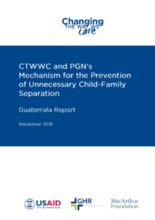From April to September 2022, CTWWC and PGN implemented a process to prevent unnecessary child-family separation and provide accompaniment using the case management methodology and reintegration criteria with 18 families to promote children’s permanence within their current family environment.
The first step was identifying children vulnerable to rights violation or at risk of unnecessary family separation. For these cases, the PNA/PGN had already determined the possibility to reinstate their rights through an administrative process and all of the families resided in the municipalities of the department of Guatemala.
The PNA and PGN psychosocial teams from the department of Guatemala referred the cases to CTWWC staff by submitting a detailed case report in a form designed by PGN and CTWWC. PGN and CTWWC caseworkers later validated the information in a case-analysis meeting. They analyzed the support options and the start date for CTWWC/PGN accompaniment and follow-up to the PNA/PGN Protection Plan. This included home visits to 18 families, referral to social services, and family strengthening through economic and psychosocial support.
CTWWC psychosocial team registered the observations and discussion about the wellbeing of the child and the family based on the six wellbeing domains of the reintegration model promoted by CTWWC. All this facilitated the implementation of the Protection Plan and helped caseworkers provide orientation to families during the home visits. Caseworkers documented the progress of the activities implemented in a follow-up report, which they later submitted to the PNA/PGN caseworkers every month. The information presented in this report was enriched by the revision of the detailed reports issued by PGN and the data obtained from case review meetings held with PNA/PGN psychosocial teams.
This report includes the key lessons learned and the achievements resulting from CTWWC/PGN follow-up and family and economic strengthening activities provided to 18 families, along with information about 66 children and adolescents who remained with their family and community environment. The project also raised families’ awareness about the importance of providing children with safe and protective settings to foster their wellbeing through positive and loving parenting.

